It’s Bigger Than We Think
Caren: As we write this article, we are in the middle of a world-wide pandemic and a consequential election season. Both events ask us to address big, core questions: What kind of people do we want to be? How do we resolve our conflicts? How do we uphold justice? What principles do we want to teach our children? How will we heal our divided nation?
The kindness factor is part of the healing our society needs. Kindness may sound small, but it’s bigger than we think. Kindness is not a nicety done when convenient. In a single act of kindness lies acknowledgement, respect, compassion, empathy, and forgiveness. When accepted, an act of kindness is a two-way gift. Disguised as a singular act, it can send ripples of change beyond the people directly involved, affecting unknowable others. By cultivating kindness to our homes, schools and community lives, we have the power change our very culture.
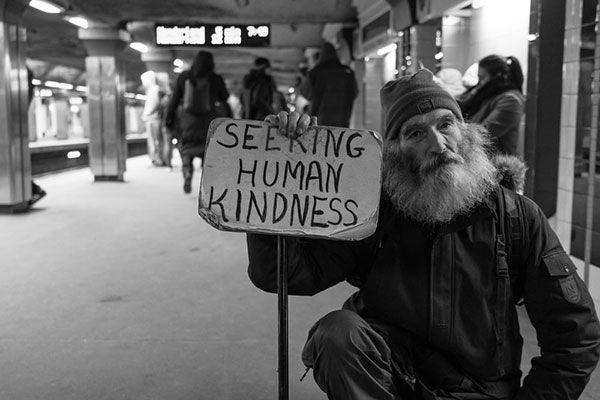
“Three things in human life are important. The first is to be kind. The second is to be kind. The third is to be kind.”
—William James
“A single act of kindness throws out roots in all directions and the roots spring up and make new trees.”
—Amelia Earhart
“If I cannot do great things, I can do small things in a great way. Even the smallest act of kindness can make a big difference in the world.”
—Martin Luther King
“Never worry about numbers. Help one person at a time and always start with the person nearest you.”
—Mother Teresa
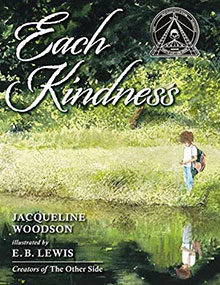 Award-winning author Jacqueline Woodson uplifts the power of kindness in her picture book Each Kindness, illustrated by E.B. Lewis. The story begins as Chloe watches the school principal introduce Maya, a new girl to the school. “We all stared at her. Her coat was open and the clothes beneath it looked old and ragged. Her shoes were spring shoes, not meant for the snow. A strap on one of them had broken.” Maya takes a seat next to Chloe and smiles. Chloe scoots her desk a few inches away and turns to look out the window.
Award-winning author Jacqueline Woodson uplifts the power of kindness in her picture book Each Kindness, illustrated by E.B. Lewis. The story begins as Chloe watches the school principal introduce Maya, a new girl to the school. “We all stared at her. Her coat was open and the clothes beneath it looked old and ragged. Her shoes were spring shoes, not meant for the snow. A strap on one of them had broken.” Maya takes a seat next to Chloe and smiles. Chloe scoots her desk a few inches away and turns to look out the window.
Chloe, her friends, and the rest of the class show little kindness toward Maya. The day Maya’s desk sits empty, Chloe’s teacher brings in a bowl filled with water. As the children watch, Ms. Albert drops a pebble into the bowl. “This is what kindness does,” Ms. Albert said. “Each little thing we do goes out, like a ripple into the world.” Chloe is left with an emptiness in her stomach. How many opportunities had she missed to offer kindness to Maya? Readers are left with the invitation to send kindness rippling out into the world.
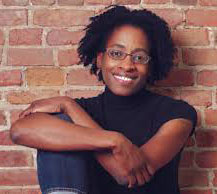
On her website, Jacqueline Woodson writes:
“At some point in our lives, we are all unkind. At some point, we are all treated unkindly. I wanted to understand this more. I think too often we believe we’ll have a second chance at kindness – and sometimes we don’t. I do believe, as Chloe’s teacher, Ms. Albert, says, that everything we do goes out, like a ripple into the world. I wrote this because I believe in kindness.”
Going Deeper, Teaching Kindness: Caren and Ellie
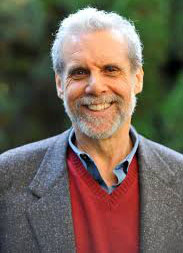
Research in neuroscience and neuroplasticity is showing us new ways to think about learning and schools. Helping students socially and emotionally enhances their academic learning. When students feel safe and enjoy their school environment, their brain state is more attuned to learning. Dr. Daniel Goleman, author of the international bestseller, Emotional Intelligence writes:
The centers of the brain are intricately interwoven with the neurocortical areas involved in cognitive learning … When a child trying to learn is caught up in a distressing emotion, the centers for learning are temporarily hampered. The child’s attention becomes preoccupied with whatever may be the source of the trouble. Because attention is itself a limited capacity, the child has that much less ability to hear, understand, or remember what a teacher or a book is saying. In short, there is a direct link between emotions and learning.
Dr. Goleman argues that practicing kindness develops hardwiring in our brains, making compassion and kindness more natural and our relationships more positive. In his webinar, “Why Compassion Matters Today and Tomorrow,” he claims that the more we practice kindness, the more we change our behavior, making our homes and schools more positive, kind, and compassionate places to be. (Watch Dr. Goleman’s lecture.)
Kindness Pals
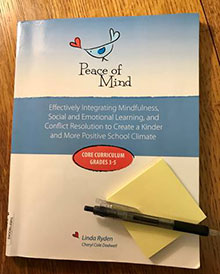 Linda Ryden introduces the idea of “Kindness Pals” in Peace of Mind, her curriculum for Grades 3 – 5. Each week, children are paired with a new person in their classroom with the invitation to do something kind for their partner. At the end of the week, children share their kindness experience. She asks, “How does your body feel when you are kind? How have your thoughts changed towards your Kindness Pal? How did you feel when your kindness pal was kind to you?” If Chloe and Maya had been Kindness Pals, their story might have been quite different.
Linda Ryden introduces the idea of “Kindness Pals” in Peace of Mind, her curriculum for Grades 3 – 5. Each week, children are paired with a new person in their classroom with the invitation to do something kind for their partner. At the end of the week, children share their kindness experience. She asks, “How does your body feel when you are kind? How have your thoughts changed towards your Kindness Pal? How did you feel when your kindness pal was kind to you?” If Chloe and Maya had been Kindness Pals, their story might have been quite different.
Kindness ripples, ensuring that a little goes a long way. If we believe in, teach and practice daily kindness, imagine how can we change our homes, classrooms, neighborhoods and our country.
Resources
Daniel Goleman’s lecture was hosted by Emory University’s Center for Contemplative Science and Compassion Based Ethics. For more information about Emory University’s SEE Learning (Social, Emotional, Ethical) innovative K‑12 developmental education program, go to www.seelearning.emory.edu
Peace of Mind: Effectively Integrating Mindfulness, Social and Emotional Learning, and Conflict Resolution to Create a Kinder and More Positive School Climate, Peace of Mind, LLC Washington D.C. 20015, www.TeachPeaceofMind.com.
_______________________________________
For each Peace-ology post, Caren and Ellie partner to learn and explore the meaning of peace by talking and listening with each other. If you’d like to share your ideas about peace, books, and children, please share your comments here, or visit our websites.

Such an important message, now more than ever.